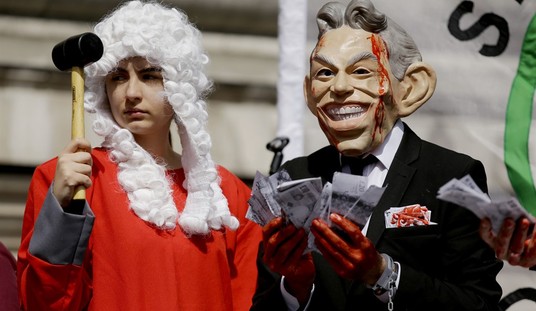This campaign season has seen a shift in the normal formula for how journalists and political candidates interact. That’s been made clear by the relationship which the political press has had with those who are still willing to talk to them and one particular woman who won’t. The normally Democrat loving cable and network news shows have, in the past month, taking to venting their spleens against Hillary Clinton over her refusal to take questions or even toss them much more than a wadded up Chipotle wrapper as they jog after her Mystery Machine van. But the usual gaggle of campaign reporters have run into a different set of problems with Republican candidates, including some like Scott Walker who have simply refused to answer stupid questions and moved on to the next subject.
All of this seems to have been a bit much for Bryan Cooper at The Week, who sadly throws up his hands and declares that 2016 marks the death of the political campaign reporter.
While I’m all for candidates answering tough questions, I’ve got a better idea. Journalists ought to simply skip the whole campaign circus, and forget about access journalism when it comes to the presidential race. It’s a waste of time and money.
As Jay Rosen points out, the carping is pretty rich coming from elite political journalists, most of whom pride themselves on being cynical, ultra-realistic, savvy interpreters of how politics works. (Setting aside the fact that the great majority of such people merely ape the elite conventional wisdom, and are often badly mistaken as to political mechanics.) The members of what Rosen calls the “Church of the Savvy” are getting a big taste of their own cynical medicine, and they’re retreating into the kind of righteous objections about democratic integrity that they scorned for decades.
But it turns out that our political system regards journalism in the same way it regards laws against bribing members of Congress: as a minor inconvenience to be ignored wherever possible. Which these days means most of the time.
Adams begins his explanation of why we’ve reached this sorry state by concluding that the candidates simply don’t need the media anymore. The reason? Because Politicians now have a professional grasp of social media.
I would raise a couple of objections to this analysis. First of all, the idea that campaigns have mastered social media may be just a tad premature, and we don’t even need to invoke Anthony Weiner on this one. How many campaigns have made exactly the wrong type of headlines for things which popped up on their Twitter accounts or Facebook pages? In reality, social media remains more of a bear trap for many candidates than some sort of yellow brick road to success.
Further, while social media – when properly managed – can be a fantastic outreach tool in dealing with supporters, that reach is still somewhat limited, and that includes blogs as well as the usual smartphone driven apps. Hot Air rings up well more than a million unique users in a day (and occasionally well beyond that) during the heat of a campaign, and that’s an impressive number to be sure. But it’s still barely a ripple on the pond of the total number of voters who go to the polls. A vast number of people in the United States are reading blogs and using social media, but they’re not all there for political coverage. In fact, we represent a relatively small subculture on the web. Most of America watches television too, but there are many, many more people watching sports, reality TV shows and sitcoms than the sad collection of geeks like me who sit glued to CNN or CSPAN all day long. The fact is, candidates still need television and radio to get to that wider audience who aren’t already obsessed with the game of politics.
But that’s not to say that the sea change we’re seeing in how candidates relate to the media isn’t a good thing. There is a significant opportunity here, and it may improve the coverage we wind up receiving. But that won’t come through some new and improved work ethic by journalists… it needs to come from candidates who are willing to train those journalists to do their jobs.
Until recently, presidential candidates used to tread in fear of the media. No matter how stupid the gotcha questions were nor how inane the subject matter, it seemed as if politicians felt they must treat each and every question with the gravitas reserved for life and death decisions. That pattern is, thankfully, ending. When reporters continue to play the gotcha game and try to generate clickbait out of each perceived “gaffe” they can generate, candidates need to continue this new tradition of scoffing at them and moving on until someone asks a serious question. And if there are none to be found then, yes, they may have to go the Hillary route for a while and simply walk away. The reporters who want to cover actual news will rise to the top through access.
What’s the worst that can happen if the candidates do this? Are you really going to not vote for Carly Fiorina based solely on the fact that she refused to offer her take on comments by Bobby Ginspitter (the controversial Republican candidate for County Coroner in Baskerville, Connecticut) regarding how women who carry small dogs in purses are airheads?
The candidates have the power in this equation and some of them seem to be starting to realize it. For their part, the reporters still have options. If candidates refuse to answer questions on policy or serious wrongdoing, that will be a real news story which will resonate with viewers. The free market of ideas can weed out the wheat from the chaff in this mess. In the meantime, political campaign reporting can continue to thrive. It just needs to evolve to reflect changing standards and expectations.








Join the conversation as a VIP Member